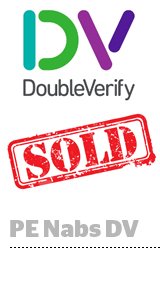
DoubleVerify said Wednesday that private equity firm Providence Equity Partners has acquired a majority stake in the company.
AdExchanger reported in July that DoubleVerify was exploring a sale that would have valued the company in the $350 million range. The exact size of the Providence stake was not disclosed in the deal announcement, but The Wall Street Journal’s sources pegged the investment at $200 million and the company’s total value at “more than $300 million.”
KeyBanc Capital Markets served as DoubleVerify’s financial adviser on the deal.
DoubleVerify CEO Wayne Gattinella will stay on as CEO after the transaction closes. Laura Desmond, who formerly served as Publicis Groupe CRO and Starcom MediaVest CEO, is joining the company’s board of directors.
DoubleVerify, which has revenues of roughly $70 million, has raised $46.5 million, most recently a $33 million VC round led by Institutional Venture Partners and JMI Equity. The company was founded in 2008.
“With Providence’s sector expertise and strategic insight, DoubleVerify is well-positioned to capitalize on the outsized set of market opportunities and to launch new services that define the future of digital advertising engagement,” Gattinella said in a statement.
Integral Ad Science is now the last independent third-party verification company. Moat was acquired by Oracle in April.
PE Rationale
It makes sense for DoubleVerify to sell to a private equity firm that can help the company grow and find a forever home with a player like Nielsen, Adobe or, more likely, one of the larger marketing clouds.
But riding off into the sunset with Nielsen or Salesforce, for example, would be a very different exit than ending up as part of Adobe, which has doubled down on its media execution capabilities, most recently through its acquisition of TubeMogul in November.
If a platform with media-buying capabilities scoops up a third-party verification provider, the latter’s independent street cred goes out the window.
The same would be true if a player like Snap, which as of late has shown itself to be both acquisitive and focused on the measurement space, decided to shell out for its own measurement provider. The buy side doesn’t cotton to publishers that seem to be grading their own viewability homework.
But buying third-party measurement tech is about more than just determining whether an ad was viewable or not. One of the reasons Oracle spent a reported $850 million to acquire Moat was to tie viewability to results, rather than to measure viewability for viewability’s sake.
Providence Equity’s other investments in the media and information space include OpenSky, SnapApp, Hulu, Univision, Warner Music Group and YES Network.
More to come.
This post was syndicated from Ad Exchanger.

More Stories
Xfinity Welcomes Fortune-Seekers to the Mythical World of Boomtown
Dismantling Google Will Not Fix the Adtech Ecosystem
Meta’s Threads Begins Global Ad Rollout Within Its Feed